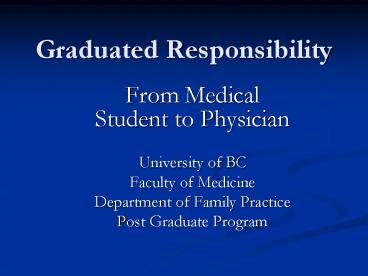Graduated Responsibility - PowerPoint PPT Presentation
1 / 22
Title: Graduated Responsibility
1
Graduated Responsibility
- From Medical Student to Physician
- University of BC
- Faculty of Medicine
- Department of Family Practice
- Post Graduate Program
2
Residents are ADULT LEARNERS
- What are some of the characteristics of adult
learners? - Take two minutes to write down several
characteristics of adult learners.
3
Adult Learners are
- Self directed
- Learner centred
- Problem oriented
- Curiosity driven
- Reflective
- Individually and culturally different
4
Remember !
- With Adult learners our role is that of a GUIDE
as much as a teacher.
5
Challenge
- Finding the balance between supervision and
independence when teaching family practice
residents. - What are the consequences of too little or too
much independence?
6
Too little responsibility
- Boredom
- Demeaning
- Unchallenged
- Limited Progress
- No confidence
7
Too Much Responsibility
- Do not feel safe to challenge themselves
- Fear
- Medical error and undesired outcomes
8
Educational Diagnosis
- Deciding where your learner is
- What is an educational diagnosis?
9
Bordage stages of learning
- I Reduced knowledge
- II Dispersed knowledge
- III Elaborated knowledge
- IV Compiled knowledge
10
Discuss
- Think of the resident you have now or have had
recently. At what stage are they with many of
the topics you deal with? - Where should they be?
11
Benchmarks
- The Program has developed a list of benchmarks to
help you understand the levels of knowledge and
skills a resident should have developed at each
stage of their residency. See - http//postgrad.familymed.ubc.ca/resources/resourc
es-for-evaluating-residents/
12
Start of 1st year
- Hospital Hx and Px taking an hour
- Large Knowledge gaps
- Common vs. Uncommon?
- Little deductive ability
- Therapeutics weak
- Contextual issues weak
13
You need to
- Observe Hx and Exam
- Observe pelvic exams and procedures
- Daily observation of parts of visits
- Question reasoning
- Correct mistakes
- Encourage resident to read around issues
14
2nd half of 1st year
- Crisper and more focused Hx and exam
- Better appreciation of range of common problems.
(fewer esoteric dx.) - Better active listening
- More rational use of investigations
- Better therapeutics
15
You need to
- Discuss each case but briefer and focused
- Allow resident more decision making
- Watch for gaps and encourage reading up, rapid
EBM? Online information? - Review interviews and exams regularly and
formally weekly. - Watch for over confidence
16
2nd year to graduation
- Significantly less supervision.
- As the resident progresses give him or her more
opportunity to be independent.
17
Teaching Techniques
- Take a couple of minutes and write down what
teaching techniques you use when working with a
medical student, a first year or a second year
resident? Do you have techniques that allow
increasing degrees of responsibility?
18
Teaching Techniques
- Case Discussion
- For First Year residents needing greater
supervision - Case Review
- Chart Review and recall
- - For Second Year residents or those needing
less supervision
19
Suggestion
- 1st day, resident watches you
- Next 2-3 days, you watch to make an educational
diagnosis - Then, regular but decreasing direct observations
- Credit demonstrated competencies
- Micro-skills (one minute preceptor)
- Graduate to reviews
- Critical reflection, Open ended questions
20
Progression
- Observation and direction, knowledge without
application Medical Student - Application of knowledge, Freedom to err in a
safe environment Early Residency - Some independence with regular review Late
Residency - Independence with occasional review and
observation End Residency
21
Ask yourself
- Is the resident more independent during the last
week than the first? - Is part of your teaching objective to encourage
independence? - Has the resident acquired skills for which he/she
is justifiably confident?
22
Thank You
- This module was written as an aid to the
Preceptors in the Postgraduate Family Practice
Program at the University of BC. - Study credit is available to groups of preceptors
who complete the module - Please give us your feedback on the module so
that we may improve it for others. - Email you comments to Dr. Christie Newton,
Faculty Development, UBC Family Practice - christie.newton_at_familymed.ubc.ca































